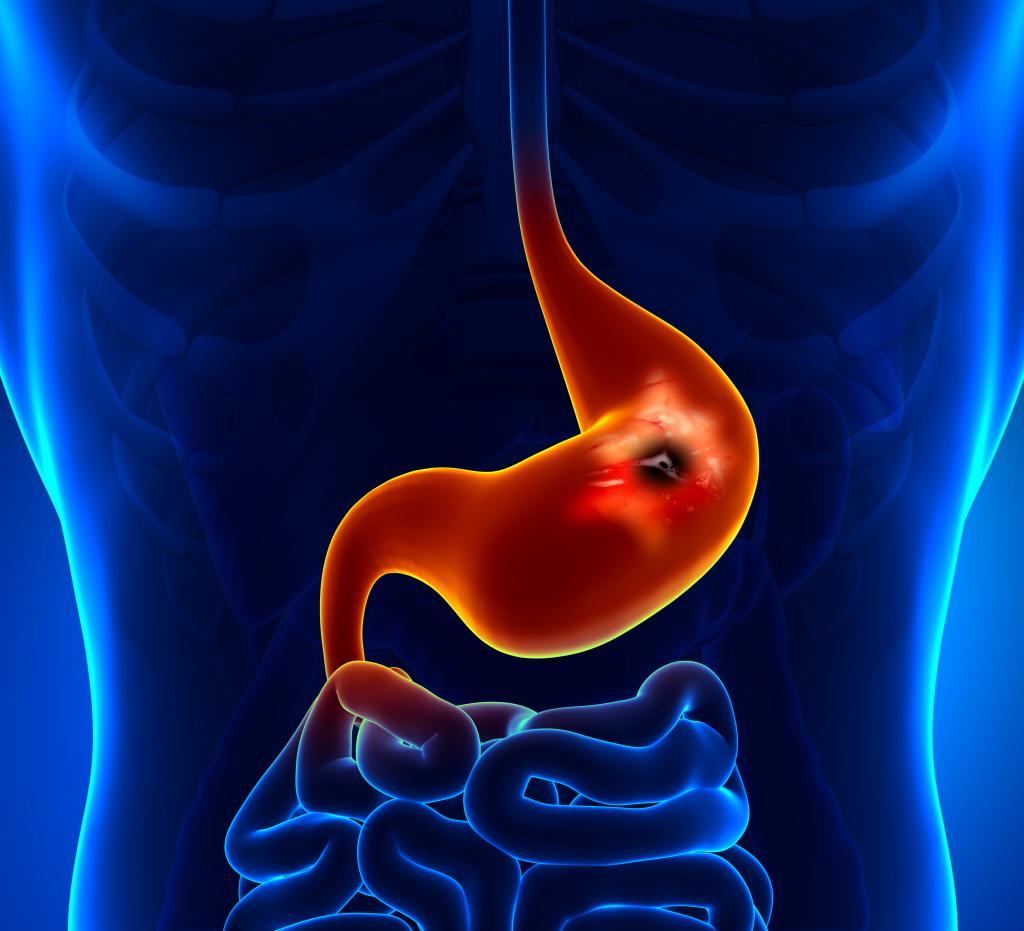Cancer can grow in any and every area of the body, its cells spreading rapidly. And while there are many different types of cancer, one of the more complex is gastric cancer. Better known as stomach cancer, gastric cancer can take a number of different forms.
Like all types of cancer, stomach cancer typically begins in one area of the body – the stomach – and spreads to others. And, as stomach cancer progresses, it becomes more challenging to treat. That’s why it’s so important to know the facts about this disease before it potentially affects your life.
 decade3d – anatomy online / Shutterstock
decade3d – anatomy online / ShutterstockWho is At Risk for Gastric Cancer?
Gastric cancer, or stomach cancer, can affect anyone. All it takes is for cancer cells to begin growing in the stomach.
But there are certain factors or lifestyle habits that can influence – and increase – your odds of developing stomach cancer. If you’re aware of these risk factors, you may be able to better understand how at-risk you are, or potentially make changes that lower your risk.
According to WebMD¹, the following factors can increase the risk of stomach cancer:
- Smoking
- Eating a diet that’s high in smoked, pickled, or salty foods
- Being overweight or obese
- Having Type A blood
- Undergoing stomach surgery for ulcers
- Having the Epstein-Barr virus
- Working in the coal, metal, timber, or rubber industries
- Exposure to asbestos
Additionally, individuals who have certain genes can also have an increased risk of stomach cancer. If you have a family history of gastric cancer, talk with your doctor about whether or not you may be predisposed due to your genes.
The Signs and Symptoms of Gastric Cancer
Many types of cancer grow within the body for years. Plenty of cancers don’t show symptoms early on, and this can make them incredibly difficult to diagnose.
And stomach cancer too begins to grow slowly over a long period of time. Pre-cancerous changes start happening in the stomach’s lining, and these changes don’t always result in any symptoms.
However, stomach cancer is different because it does begin causing changes in your health before other cancers. This type of cancer can actually be detected early, and symptoms can start to appear early on as the cancer grows. The first symptoms of stomach cancer, according to WebMD², are typically:
- Indigestion
- A bloated feeling after eating
- Heartburn
- Nausea
- A decrease in or loss of appetite
These symptoms can seem relatively normal or unconcerning initially. If you’re noticing changes like these in your health, it’s a good idea to talk with your doctor to rule out other ailments or determine if they’re being caused by stomach cancer.
As stomach cancer continues to grow, it can begin causing additional symptoms. And these symptoms can be noticeably more problematic³:
- Pain or swelling in the stomach
- Blood in your stool
- Vomiting
- Difficulty swallowing
- Changes to your bowel habits, particularly constipation or diarrhea
- Unexplained weight loss
- Yellowing of the eyes or skin
- Weakness
- Fatigue
If you’re concerned about new changes to your health, make an appointment to see your doctor to determine the cause. Stomach cancer can exhibit similar symptoms to other conditions, and it’s important to get to the root of the problem.
How This Cancer Progresses
Each case of stomach cancer is different. While stomach cancer typically exhibits familiar symptoms and progresses over time, it can vary from person to person.
There are a few different types of stomach cancer. Each type will have its own peculiarities, progression, and symptoms. The American Cancer Society⁴ categorizes the types as:
- Adenocarcinoma: The most common type of stomach cancer. 90 to 95 percent of all stomach cancers fall into this type.
- Lymphoma: A cancer that originates in the immune system, but can also spread to the wall of the stomach.
- Gastrointestinal stromal tumor (GST): A rare tumor that forms in the digestive tract, most commonly in the wall of the stomach. Sometimes these tumors are non-cancerous, but they can be cancerous.
- Carcinoid tumor: A type of tumor that begins in the hormone-making cells found in the stomach. This type of cancerous tumor doesn’t typically spread beyond the stomach.
No matter which type of stomach cancer you develop, the stage is important. The stage of gastric cancer determines treatment plans, and it also affects the prognosis for your overall health and survival.
The stage is based on how much stomach cancer has spread throughout the body, or how long it’s been present. WebMD⁵ reports that the official stages are:
- Stage 0: The cancer is solely in the interior lining of the stomach.
- Stage I: A tumor is present in the stomach’s lining. The cancer may have spread to nearby lymph nodes.
- Stage II: Cancer is present in all layers of the stomach.
- Stage III: The cancer spreads throughout the stomach and nearby organs. Or, if the cancer is smaller, it has spread deeply into nearby lymph nodes.
- Stage IV: This is the final stage of stomach cancer. The cancer spreads throughout the body, potentially to areas like the lungs or brain.
Treating Gastric Cancer
How gastric, or stomach, cancer is treated depends on a few factors. First, your doctor will determine how significant your cancer is and where it is located. Additionally, your doctor will determine the stage of your cancer.
These factors will determine the treatment plan for your unique case of stomach cancer. There are a number of different treatment options for stomach cancer, but how they are used depend on your health.
According to the Mayo Clinic⁶, stomach cancer can be treated with the following methods:
- Surgery: Surgery is used to remove tumors and any cancerous areas or tissue around those tumors, such as lymph nodes.
- Radiation therapy: A treatment method that uses beams of energy, like x-rays, to kill cancer cells within the body.
- Chemotherapy: A drug treatment that kills cancer cells throughout the body. It can kill cancerous cells that remain after other types of treatment.
- Targeted therapy: This type of treatment uses medication to attack specific aspects of cancerous cells or to kill those cells.
If you are diagnosed with stomach cancer, your doctor will develop a treatment plan based on your diagnosis. The key to treating cancer is getting diagnosed as early as possible. Early detection saves lives, and it can make a huge difference.
Talk with your doctor if you’re concerned about your risk of stomach cancer. Your doctor can help you determine your risk factors, test and screen for cancer if you’re concerned about changes to your health, and help guide your medical needs.


